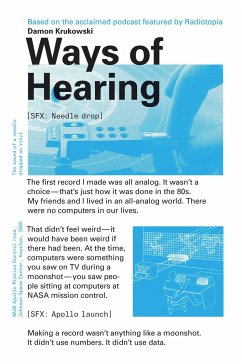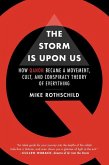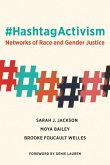Strange as this adaptation may seem in theory, it works perfectly in practice. The way Krukowski approaches his subject makes for engrossing and enlightening reading. Seattle Times
Because the book reads like an illustrated script, complete with sound-effect and scene-setting embeds, the narrative played out vividly in my mind.
The AV Club
Damon Krukowski's Ways of Hearing is an ear-opener. Based on the podcast of the same name from Radiotopia, the book is a multimodal experience, one that opens the ears through the eyes.
Columbia Journal
This has echoes of Berger and Marshall McLuhan in its approach. I think it will be seen as an important book one day, in terms of distilling how the change from analogue to digital has changed our way of experiencing the world.
Financial Times
Ways of Hearing poses a compelling counternarrative to typical tech criticism: instead of glibly lamenting how digital life destroys intimacy, Krukowski asks listeners to pay attention to both the sonic as well as the political qualities of sound. Krukowski makes us consider sound what we hear, what we don't, how, and why as a means of listening but also, perhaps, of resisting.
The Baffler
Krukowski's book ultimately succeeds as a worthy successor to Berger's in the ways that it differs from its predecessor. Listening isn't seeing; why should a book about one unnecessarily echo a book about the other? Krukowski gets more right by charting his own territory than he would by more closely following Berger's blueprint.
Electric Literature
Krukowski's book ultimately succeeds as a worthy successor to Berger's in the ways that it differs from its predecessor. Listening isn't seeing; why should a book about one unnecessarily echo a book about the other? Krukowski gets more right by charting his own territory than he would by more closely following Berger's blueprint.
Metapsychology
Ways of Hearing elevates attentive, contemplative listening as a way of extending the human sensorium to enhance our interaction with the world through technology. Hearing involves awareness of surrounding sounds. Listening, paying attention to what we hear, elevates our engagement with those sounds and all they have to offer. By listening closely, writes Krukowski, "we might discover more about what is meaningful signal for each of us. And how we might best share those signals with one another."
LEONARDO
Because the book reads like an illustrated script, complete with sound-effect and scene-setting embeds, the narrative played out vividly in my mind.
The AV Club
Damon Krukowski's Ways of Hearing is an ear-opener. Based on the podcast of the same name from Radiotopia, the book is a multimodal experience, one that opens the ears through the eyes.
Columbia Journal
This has echoes of Berger and Marshall McLuhan in its approach. I think it will be seen as an important book one day, in terms of distilling how the change from analogue to digital has changed our way of experiencing the world.
Financial Times
Ways of Hearing poses a compelling counternarrative to typical tech criticism: instead of glibly lamenting how digital life destroys intimacy, Krukowski asks listeners to pay attention to both the sonic as well as the political qualities of sound. Krukowski makes us consider sound what we hear, what we don't, how, and why as a means of listening but also, perhaps, of resisting.
The Baffler
Krukowski's book ultimately succeeds as a worthy successor to Berger's in the ways that it differs from its predecessor. Listening isn't seeing; why should a book about one unnecessarily echo a book about the other? Krukowski gets more right by charting his own territory than he would by more closely following Berger's blueprint.
Electric Literature
Krukowski's book ultimately succeeds as a worthy successor to Berger's in the ways that it differs from its predecessor. Listening isn't seeing; why should a book about one unnecessarily echo a book about the other? Krukowski gets more right by charting his own territory than he would by more closely following Berger's blueprint.
Metapsychology
Ways of Hearing elevates attentive, contemplative listening as a way of extending the human sensorium to enhance our interaction with the world through technology. Hearing involves awareness of surrounding sounds. Listening, paying attention to what we hear, elevates our engagement with those sounds and all they have to offer. By listening closely, writes Krukowski, "we might discover more about what is meaningful signal for each of us. And how we might best share those signals with one another."
LEONARDO








